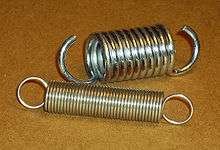coil
See also: Coil
English
Etymology 1
From Middle French coillir (“to gather, pluck, pick, cull”) (French: cueillir), from Latin colligo (“to gather together”), past participle collectus, from com- (“together”) + lego (“to gather”); compare legend. Doublet of cull.

Helical or coil springs
Noun
coil (plural coils)
- Something wound in the form of a helix or spiral.
- the sinuous coils of a snake
- Washington Irving
- The wild grapevines that twisted their coils from tree to tree.
- Any intrauterine device (Abbreviation: IUD)—the first IUDs were coil-shaped.
- (electrical) A coil of electrically conductive wire through which electricity can flow.
- (figuratively) Entanglement; perplexity.
- a. 1722, Matthew Prior, “Human Life”, in H. Bunker Wright, Monroe K. Spears, editors, The Literary Works of Matthew Prior, volume I, Second edition, Oxford: Clarendon Press, published 1971, page 687:
- What trifling coil do we mortals keep;
Wake, eat, and drink, evacuate, and sleep.
-
Synonyms
- (coil of conductive wire): inductor
Derived terms
- coil spring
- impedance coil
- mosquito coil
- Oudin coil
- Tesla coil
Translations
something wound
|
|
intra-uterine contraceptive device
electrical
|
|
Verb
coil (third-person singular simple present coils, present participle coiling, simple past and past participle coiled)
- To wind or reel e.g. a wire or rope into regular rings, often around a centerpiece.
- A simple transformer can be made by coiling two pieces of insulated copper wire around an iron heart.
- To wind into loops (roughly) around a common center.
- The sailor coiled the free end of the hawser on the pier.
- To wind cylindrically or spirally.
- to coil a rope when not in use
- The snake coiled itself before springing.
- (obsolete, rare) To encircle and hold with, or as if with, coils.
- (Can we find and add a quotation of T. Edwards to this entry?)
Translations
wind into regular rings
|
wind into loops
Etymology 2
Origin unknown.
Noun
coil (plural coils)
- (now obsolete except in phrases) A noise, tumult, bustle, or turmoil.
- François Rabelais (in translation), Gargantua and Pantagruel
- And when he saw that all the dogs were flocking about her, yarring at the retardment of their access to her, and every way keeping such a coil with her as they are wont to do about a proud or salt bitch, he forthwith departed […]
- 1594, William Shakespeare, Titus Andronicus, Act III:
- If the windes rage, doth not the Sea wax mad, / Threatning the welkin with his big-swolne face? / And wilt thou haue a reason for this coile?
- 1624, John Smith, Generall Historie, in Kupperman 1988, p. 162:
- this great Savage desired also to see him. A great coyle there was to set him forward.
- 1704, Jonathan Swift, A Tale of a Tub:
- they continued so extremely fond of gold, that if Peter sent them abroad, though it were only upon a compliment, they would roar, and spit, and belch, and piss, and f—t, and snivel out fire, and keep a perpetual coil, till you flung them a bit of gold […]
- François Rabelais (in translation), Gargantua and Pantagruel
Quotations
- For quotations of use of this term, see Citations:coil.
Derived terms
Translations
Further reading
- coil in Webster’s Revised Unabridged Dictionary, G. & C. Merriam, 1913.
- coil in The Century Dictionary, New York, N.Y.: The Century Co., 1911.
Irish
Pronunciation
- IPA(key): [kɛlʲ]
Noun
coil m
Mutation
| Irish mutation | ||
|---|---|---|
| Radical | Lenition | Eclipsis |
| coil | choil | gcoil |
| Note: Some of these forms may be hypothetical. Not every possible mutated form of every word actually occurs. | ||
This article is issued from
Wiktionary.
The text is licensed under Creative
Commons - Attribution - Sharealike.
Additional terms may apply for the media files.